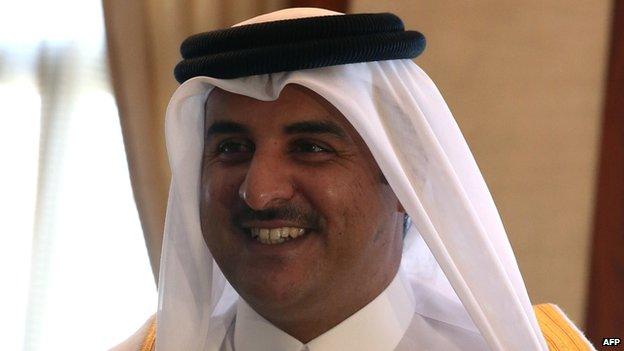Gulf ambassadors pulled from Qatar over 'interference'
- Published

Sheikh Tamim bin Hamad Al Thani succeeded his father as emir of Qatar in June 2013
Saudi Arabia, Bahrain and the UAE have withdrawn their ambassadors from Qatar after alleging that it has been meddling in their internal affairs.
A joint statement said Qatar had failed to implement a security accord signed last year stipulating non-interference.
Qatar expressed its "regret and surprise" at the move, and said it would not withdraw its own envoys.
Tensions between the emirate and other Gulf Co-operation Council (GCC) members have increased in recent years.
However, this is one of the most serious disputes yet within the grouping.
'Security and stability'
The joint statement said the three countries had made "major efforts to convince Qatar" to implement a November 2013 agreement not to back "anyone threatening the security and stability of the GCC whether as groups or individuals - via direct security work or through political influence, and not to support hostile media".
"With the greatest regret" Qatar had failed to comply, the statement added, without going into specifics.
The recall of the ambassadors from Doha was therefore necessary to ensure "security and stability".
A cabinet statement published by the official Qatar News Agency (QNA) expressed disappointment at the decision but said that it would not withdraw its ambassadors in response.
The emirate would remain committed to "preserve and protect the security and stability" of the GCC, it added.
Saudi Arabia, the UAE and Bahrain have been calling for increased military and diplomatic union within the six-nation GCC, which also includes Oman and Kuwait.
However, Qatar and Oman have so far resisted increased integration in these fields.
Brotherhood links
Oil- and gas-rich Qatar has been an increasingly vocal diplomatic player. It strongly supported Egypt's now-ousted Islamist President Mohammed Morsi and is a key backer of Islamist rebel groups in Syria.
The state is home to the influential al-Jazeera news network, which broadcasts across the world and has been critical of Saudi Arabia and other Gulf states.
Anti-Saudi programmes broadcast by al-Jazeera were thought to have been a major reason for Riyadh's decision to withdraw its ambassador to Qatar from 2002 until 2008.
Qatar is also seen as a major financial and diplomatic supporter of the Muslim Brotherhood, an Islamist movement which is banned in Saudi Arabia and the UAE.
On Monday, a Qatari citizen received a seven-year jail sentence in the UAE for supporting an Islamist political society, al-Islah, which prosecutors assert is a local branch of the Egypt-based Brotherhood.
Meanwhile, nine al-Jazeera journalists are currently on trial in Egypt on charges including joining or aiding a terrorist organisation, as the Brotherhood was designated after the military overthrew Mr Morsi.
- Published13 January 2014
- Published5 July 2013
- Published1 July 2013